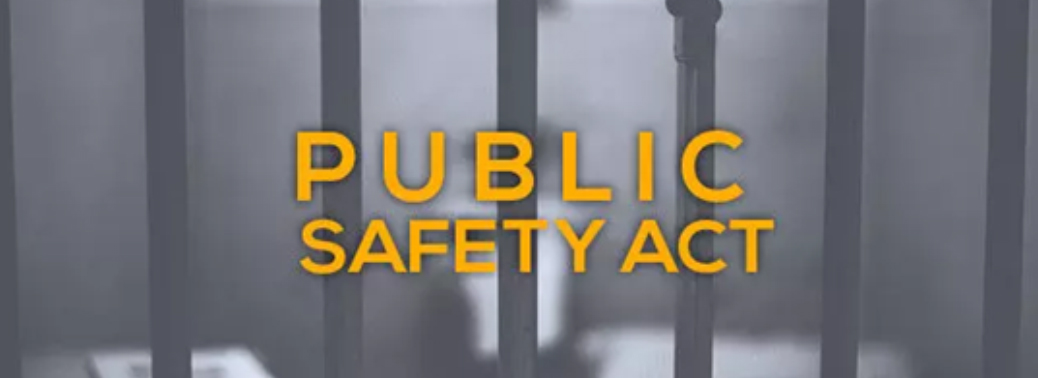JAMMU & KASHMIR PUBLIC SAFETY ACT
17, Sep 2019

Prelims level : Governance & Polity- Policies, Rights Issues
Mains level : GS-III- Security challenges and their management in border areas; linkages of organized crime with terrorism.
Why in News?
- National Conference leader and former Jammu and Kashmir chief minister Farooq Abdullah has been detained under the Jammu and Kashmir Public Safety Act.
- Last month, former IAS officer Shah Faesal was stopped at New Delhi airport and sent back to Kashmir, where he has been detained under the Public Safety Act (PSA).
About Jammu & Kashmir Public Safety Act (PSA):
- Jammu and Kashmir Public Safety Act 1978, was enacted “in the interest of the security of the State and public order”.
- It contains provisions for designating protected and prohibited areas, prevention of circulation of documents in the interests of communal harmony, etc.
- The Government can order the detention of a person:
- To prevent him from acting in any manner prejudicial to security of the State of maintenance of the public order.
- If he is a foreigner within the meaning of Foreigners Act
- If he is a person residing in the area of the State under the occupation of Pakistan and it is necessary to regulate his presence or to expel him.
- As per the definition given in the Act, “acting in any manner prejudicial to the maintenance of public order” means:
- 1.Promoting, Propagating, or attempting to create, feelings of enmity or hatred or disharmony on grounds of religion, race, caste, community, or region;
- 2.Making preparations for using, or attempting its use, or using, or instigating, inciting, or otherwise abetting the use of force where such preparation, using, attempting, instigating, inciting, provoking or abetting, disturbs or is likely to disturb public order;
- 3.Attempting to commit, or committing, or instigating, inciting, provoking or otherwise abetting the commission of mischief within the meaning of section 425 of the Ranbir Penal Code where the commission of such mischief disturbs, or is likely to disturb public order.
- Detention orders under PSA can be issued by Divisional Commissioners or District Magistrates.
- The detaining authority need not disclose any facts about the detention “which it considers to be against the public interest to disclose”.
- As per section 13(1), the authority making the detention should communicate to the detenu the reasons of detention. This is to enable the detenu to make a representation against the order of detention in exercise of the Fundamental Right guaranteed under Article 22(5) of the Constitution of India.
- However, the authority need not disclose such facts to the detenu which it considers to be against public interest to disclose (Section 13(2)). Therefore, the right under Section 13(1) can be effectively defeated if the authority chooses not to disclose whole facts in public interest.
Period of Detention:
- The Maximum period of detention in the case of persons acting in any manner prejudicial to the security of the state is two years.
- In Case of a person acting prejudicial to the maintenance of public order, the maximum period of detention is 12 months.
- Within four weeks of passing a detention order, the Government has to refer the case to an Advisory Board, which consists of a chairperson, who is or has been a judge of the High Court, and two other members who are, or have been, or are qualified to be appointed as Judges of the High Court.
- The Advisory Board has to give its opinion within 8 weeks of detention order.
- If the Advisory Board opines that there are sufficient causes for preventive detention, the Government can keep the person under detention for such period as it thinks fit, subject to the maximum limit.
Can the Detention be Challenged?
- The Advisory Board is supposed to examine if there are sufficient reasons for preventive detention.
- It is pertinent to note that the detenu has no right to engage a legal practitioner before the Advisory Board. The Advisory Board can also decide if the disclosure of grounds of detention to the detenu will affect public interest.
- The detenu is not entitled to the report of the Advisory Board, if the Board decides that it should remain confidential.
- The detention can be challenged in habeas corpus petitions filed before High Court under Article 226. However, the scope of challenge is limited to grounds of procedural violations.
- If there is non-application of mind by the detaining authority, or non-communication of the grounds of detention to the detenu, the High Court can quash the detention order as illegal.
- It is important that the District Magistrate forms independent opinion regarding the necessity of ordering preventive detention. If the Magistrate merely copies the report of the police, it will be a case of non-application of mind.
- Non-supply of relevant material documents to the detenu is also a ground for setting aside detention order(Bilal Ahmed Dar v State of J&K).
- The grounds of detention are not to be formulated in shorthand, or in a language of abbreviations or acronyms only known to the detaining authority. (Tanveer Ahmed v State of J&K)
Concerns/Criticisms of the Act:
- Global human rights organisations such as Commonwealth Human Rights Initiative (CHRI) and Amnesty International have noted in their reports that responses by various government authorities to applications filed under the Right to Information (RTI) Act, 2005 suggest that no Rules have so far been framed to lay down procedures for the implementation of the provisions of the PSA.
- An Amnesty report published earlier this year, which analysed over 2000 case studies of PSA detainees between 2007 and 2016, over 2,400 PSA detention orders were passed, of which about 58% were quashed by the courts.
- J&K parties have often blamed each other for the rampant misuse of the PSA.






